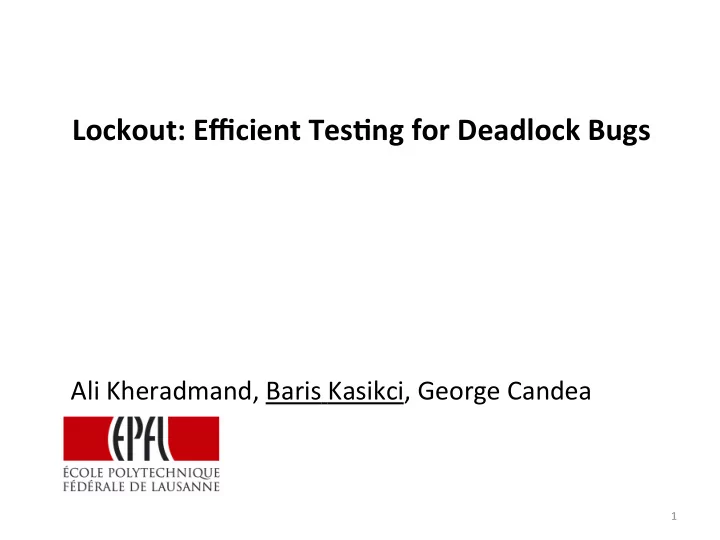

Lockout: ¡Efficient ¡Tes0ng ¡for ¡Deadlock ¡Bugs ¡ ¡ ¡ Ali ¡Kheradmand, ¡Baris ¡Kasikci, ¡George ¡Candea ¡ ¡ 1 ¡
Deadlock ¡ • Set ¡of ¡threads ¡ ¡ • Each ¡holding ¡a ¡lock ¡needed ¡by ¡another ¡thread ¡ • Wai?ng ¡for ¡another ¡lock ¡to ¡be ¡released ¡by ¡some ¡ other ¡thread ¡ ¡ 2 ¡
Why ¡Do ¡Deadlocks ¡MaBer? ¡ • Common ¡in ¡modern ¡soDware ¡ • Hard ¡to ¡detect ¡manually ¡ • Occur ¡rarely ¡during ¡execu?on ¡ Chrome ¡ Apache ¡ LimeWire ¡ Eclipse ¡ 3 ¡
Deadlock ¡Detec?on ¡ • Tradi?onal ¡tes?ng ¡ – Deadlocks ¡manifest ¡rarely ¡ ✗ ¡ • Sta?c ¡detec?on ¡ – Fast ¡(run ¡offline) ¡ ✓ ¡ – Few ¡false ¡nega?ves ¡ ✓ ¡ – Many ¡false ¡posi?ves ¡ ✗ ¡ • Dynamic ¡detec?on ¡ – Slow ¡(high ¡run?me ¡overhead) ¡ ✗ ¡ – Many ¡false ¡nega?ves ¡ ✗ ¡ – Few ¡false ¡posi?ves ¡ ✓ ¡ ¡ 4 ¡
Best ¡of ¡Two ¡Worlds ¡ • Normal ¡tests ¡can’t ¡discover ¡enough ¡deadlocks ¡ • Deadlock ¡avoidance ¡or ¡fixing ¡tools ¡tools ¡ (Dimmunix ¡[OSDI’08]) ¡take ¡a ¡long ¡?me ¡ • Need ¡to ¡find ¡the ¡schedules ¡that ¡lead ¡to ¡a ¡deadlock ¡ • How ¡to ¡increase ¡the ¡probability ¡of ¡ encountering ¡a ¡deadlock? ¡ Steer ¡the ¡program ¡towards ¡schedules ¡that ¡ ¡ are ¡likely ¡to ¡cause ¡a ¡deadlock ¡ 5 ¡
Lockout ¡ • Systema?c ¡deadlock ¡tes?ng ¡ • Increases ¡deadlock ¡probability ¡ • By ¡steering ¡the ¡scheduling ¡ • Leverages ¡past ¡program ¡execu?ons ¡ Trigger ¡more ¡deadlocks ¡with ¡the ¡same ¡test ¡suite ¡ 6 ¡
Outline ¡ • Lockout ¡architecture ¡ • Deadlock ¡triggering ¡algorithm ¡ • Preliminary ¡results ¡ • Summary ¡and ¡future ¡work ¡ 7 ¡
Lockout ¡Architecture ¡ Sta?c ¡Phase ¡ Source ¡ Instrumented ¡ Code ¡ Binary ¡ Sta?c ¡ 0100100 1010101 Analysis ¡ Instrumenta?on ¡ cout << “Hello, 0101010 World!\n”; � 0100110 ¡ 1010101 � RaceMob ¡ [SOSP’13] ¡ 8 ¡
Lockout ¡Architecture ¡ Dynamic ¡Phase ¡ End ¡of ¡execu?on ¡ Events ¡ Instrumented ¡ Run?me ¡ Previous ¡execu?ons ¡info ¡ Program ¡ Schedule ¡ perturba?on ¡ Subsequent ¡execu?ons ¡ DeadlockFuzzer ¡ [PLDI’09] ¡ 9 ¡
Outline ¡ • Lockout ¡architecture ¡ • Deadlock ¡triggering ¡algorithm ¡ • Preliminary ¡results ¡ • Summary ¡and ¡future ¡work ¡ 10 ¡
Run?me ¡Lock ¡Order ¡Graph ¡(RLG) ¡ Thread ¡1 ¡ b lock ¡ lock(a) � … � lock(b) � a c … � lock(c) � Lock ¡ ¡ � acquisi?on ¡order ¡ Poten?al ¡deadlock ¡ 11 ¡
Deadlock ¡Triggering ¡ • Selects ¡a ¡directed ¡cycle ¡in ¡RLG ¡ • Delays ¡threads ¡accordingly ¡ • Improves ¡simple ¡preemp?on ¡(CHESS ¡[OSDI’08]) ¡ • Preemp?on ¡before ¡each ¡lock ¡ ¡ lock(a) � d a � � lock(b) � c b � � 12 ¡
Deadlock ¡Triggering ¡ Time ¡ Thread ¡1 ¡ Thread ¡2 ¡ Thread ¡3 ¡ lock(a) � � � lock(b) � � � a … � � � unlock(b) � � � Run?me ¡ unlock(a) � � � c b � lock(b) � � lock(c) � � … � � unlock(c) � � unlock(b) � � � lock(c) � lock(a) � … � unlock(a) � unlock(c) � 13 ¡ �
Deadlock ¡Triggering ¡ Time ¡ Thread ¡1 ¡ Thread ¡2 ¡ Thread ¡3 ¡ Before lock (a) � RT() � � � Continue � Before lock (b) � lock(a) � � � Run?me ¡ RT() � � � Before lock (c) � Delay � � � RT() � Before lock (a) � Continue � � � lock(c) � � ) Before lock (c) � b ( k c o l e r o f e B � � RT() � Delay � Continue � � RT() � � � y a l e � lock(b) � � D � RT() � � a � � � lock(b) � � � � � � c b � � � lock(a) � lock(c) � � 14 ¡ �
Race ¡Dependent ¡Deadlocks ¡ • Preempt ¡before ¡memory ¡accesses ¡ • Ideally ¡only ¡shared ¡memory ¡accesses ¡ • Can ¡be ¡approximated ¡by ¡preemp?ng ¡aDer ¡ locks ¡ • Can ¡be ¡improved ¡using ¡sta?c ¡analysis ¡ • Can ¡be ¡improved ¡using ¡data ¡race ¡detec?on ¡ 15 ¡
Outline ¡ • Lockout ¡architecture ¡ • Deadlock ¡triggering ¡algorithm ¡ • Preliminary ¡results ¡ • Summary ¡and ¡future ¡work ¡ 16 ¡
Lockout ¡Effec?veness ¡ Program ¡ Frac0on ¡of ¡execu0ons ¡resul0ng ¡in ¡deadlock ¡(%) ¡ Na0ve ¡ Simple ¡ Deadlock ¡ Deadlock ¡ preemp0on ¡ triggering ¡ triggering ¡ + ¡ + ¡ ¡ + ¡ Post-‑lock ¡ Pre-‑memory ¡ Post-‑lock ¡ preemp0on ¡ access ¡ preemp0on ¡ preemp0on ¡ Microbench ¡ 0.00066 ¡% ¡ 0.5 ¡% ¡ 50 ¡% ¡ 50 ¡% ¡ SQLite ¡3.3.0 ¡ 0.00064 ¡% ¡ 4 ¡% ¡ 50 ¡% ¡ 50 ¡% ¡ HawkNL ¡1.6b3 ¡ 23 ¡% ¡ 64 ¡% ¡ 50 ¡% ¡ 50 ¡% ¡ Pbzip2 ¡1.1.6 ¡ 0 ¡% ¡ 0 ¡% ¡ 0 ¡% ¡ 0 ¡% ¡ HBpd ¡2.0.65 ¡ 0 ¡% ¡ ¡ 0 ¡% ¡ 0 ¡% ¡ 0 ¡% ¡ Frac?on ¡of ¡execu?ons ¡with ¡deadlocks ¡ increased ¡up ¡to ¡three ¡orders ¡of ¡magnitude ¡ 17 ¡
Outline ¡ • Lockout ¡architecture ¡ • Deadlock ¡triggering ¡algorithm ¡ • Preliminary ¡results ¡ • Summary ¡and ¡future ¡work ¡ 18 ¡
Lockout ¡ • Increases ¡deadlock ¡probability ¡ • Leverages ¡past ¡program ¡execu?ons ¡ • Effec?ve ¡ • Up ¡to ¡3 ¡orders ¡of ¡magnitude ¡more ¡deadlock ¡prone ¡ • Open ¡source: ¡ ¡ • hKps://github.com/dslab-‑epfl/lockout ¡ ¡ 19 ¡
Future ¡Work ¡ • Increasing ¡effec?veness ¡with ¡low ¡overhead ¡ • Sta?c ¡analysis ¡(data ¡races, ¡shared ¡variables) ¡ • Lockout ¡+ ¡Automa?c ¡failure ¡fixing/avoidance ¡ (Dimmunix ¡[OSDI’08], ¡CFix ¡[OSDI’12], ¡Aviso ¡ [ASPLOS’13]) ¡ • In ¡produc?on ¡ • For ¡tes?ng ¡ • Crowdsourcing ¡(Aviso ¡[ASPLOS’13], ¡RaceMob ¡ [SOSP’13]) ¡ ¡ 20 ¡
Recommend
More recommend